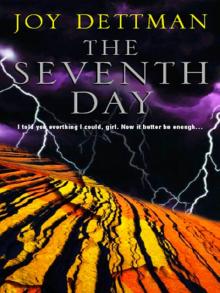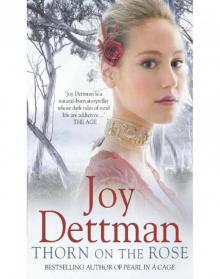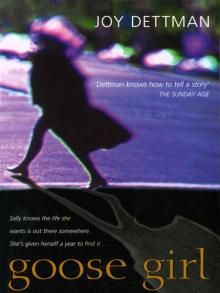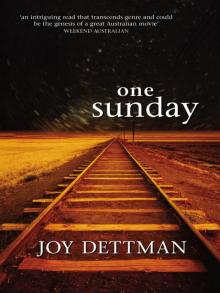- Home
- Joy Dettman
Thorn on the Rose Page 4
Thorn on the Rose Read online
Page 4
‘When things don’t go to plan for a man like your father, they’ve got no fallback plan, darlin’. Don’t be too hard on him.’
‘What about my fallback plan?’
‘Look at yourself. You’ve come home here in your fighting colours, ready to take on the world. I’m proud of you, and so is Vern and half the town.’
Handbag clasp clicking. Click-click. Click-click. It was something to do with her hands. She had cigarettes in that bag but wasn’t game to light one, not here. Click-click. Click-click.
‘Are they still here?’ No need to say their names.
‘They told Maisy they were joining the army. She hasn’t heard if they went through with it.’
‘I hope they did and I hope Hitler is waiting for them with a cannon,’ Jenny said. ‘I hope he blows them to smithereens and the dogs eat the bits.’ Click-click. Click-click. Click-click. She glanced up. ‘Did Vern get rid of it?’
‘Get rid of what?’
‘Don’t make me call it what you know I will.’
‘She’s with Elsie. Maisy named her Margot.’
‘Swap the r for a g and you’ve got maggot.’
‘She was named for some film star.’
‘I asked you to get Vern to give it to the hospital.’
‘Mothers have to sign papers when they give up their babies.’
‘I’ll sign them before I go back.’
Gertrude watched the handbag clasp click six, eight times before she reached for it.
‘You’ll wear it out, darlin’. It’s a lovely bag.’
‘Where do I get the papers to sign?’
‘Maisy is going to take her as soon as she’s old enough to wean.’
Jenny slept well that night in her sagging old bed, slept safe. Granny’s creaking old house had always radiated safety.
Sitting opposite her at the table at lunchtime, walking three steps away from her when they went for a walk in the moonlight, was safe — like being joined to her, like knowing that nothing bad could ever happen, not while Granny was close by. She wasn’t ready yet to give up that safety. She had to go, but not until the end of September.
Vern drove down on Saturday. He asked the hard questions. He asked where she’d bought her handbag.
‘There are heaps of secondhand shops down there,’ she said, which was true.
‘Where were you living?’ he asked.
‘Where I cleaned.’
‘Where?’
‘A few places. One beautiful big house built on the side of a hill. It belonged to a man and his wife who went on a tour of Europe.’
‘They wouldn’t want to be touring over there now,’ he said, and she got away, went down to the creek to sit, but Joey and Lenny came down, so she went fishing with them.
She’d almost forgotten the feel of that nibble at the line, that tugging take of a fish on the hook, the pulling weight of the fish, and the surprise of what she had on the line.
‘It’s a yellow-belly, Jen. It’s a beauty.’
She remembered the taste of Elsie’s fried fish, of her fried potatoes, Granny’s lemon tree.
Loved this place. Loved Granny and Joey and even little Lenny. Hated Woody Creek, and Amber and Sissy. Norman? She didn’t want to think about Norman.
She loved playing cards. They played that night in Elsie’s kitchen, and when she told Elsie she was going back to Melbourne sometime next week, little Lenny told her she’d better stay home or he’d punch her up. She’d made a comfortable card night foursome uneven, so Lenny, a card sharp born, had been propped on pillows at the table to make up the sixth. He could play canasta like a champion.
Gertrude had put his age at two the day Mini carried him and his baby sister in from Wadi’s camp — he may have been an undernourished three. Given a diet of eggs and goat’s milk, he’d sprung up, filled out. Smart as a whip, little Lenny Hall, feisty and fair.
Elsie and Harry Hall cared for seven kids, a mixed and growing bunch. Joey had taken Harry’s name, for convenience, as had Lenny and his sister Joany. Ronald, Maudy and Teddy were legitimate Halls. The Macdonald, fed at Elsie’s breast during the card game, was the seventh.
Jenny didn’t look at her. Couldn’t. She saw the shape of her, smelled her baby smell. Knew that baby had come out of her. Couldn’t stand the memory of her coming out, or the memory of how she’d got in. That baby made her head go cold, made it crawl, made her play the wrong card. She had to go. On Monday.
She didn’t. And on Tuesday, Vern Hooper popped in for a cup of tea.
‘You found a job right off, your grandma tells me,’ he said.
‘Yes.’
‘Your grandma tells me that you’re thinking about going back this week.’
‘Yes.’
Vern was pleased to see that girl back home, though he may have been more pleased had she been returned to her family. These past months he’d spent a few Saturday nights in Gertrude’s bed. Having a third party in the house would curtail his nighttime activities.
He knew the price of a snakeskin handbag, and he’d taken a look inside it while she was fishing on Saturday. She’d told Gertrude she had her own money. Vern knew how much money she had, and he had his doubts that she’d earned it house cleaning.
‘How much a week do they pay a fifteen-year-old maid these days?’ he asked.
‘He thought I was nineteen.’
‘Your grandma was saying that you lived for a time in Collingwood. House cleaning there?’
‘Laundry,’ she said.
‘It’s a rough area.’
‘You had to watch the things you hung on the clothes line or they disappeared.’
‘You wouldn’t make much money as a washerwoman.’
‘I lived at the house.’
She got away from him, went outside to walk Granny’s land and to watch silly little newborn goats chasing their mothers for milk through grass as tall as they, to look at Granny’s funny little house getting ready to bloom; the climbing rose which had taken over the west and part of the north side of the house was covered in buds. Another week, maybe two, and she’d see those roses open.
THE LEAVING
September’s end crept up on her. No one worried much about dates in Gertrude’s house, then suddenly it was October.
She was scared of starting again. Ready though. Her case was packed, and lighter than when it had travelled home. Gertrude’s black coat, which had kept her warm through that long Melbourne winter, hung again on its hook behind the door.
The red dress would remain in the lean-to wardrobe. It was made of a beautiful heavy material, and was probably the most expensive dress she’d ever own. Granny called it her fighting colours, Norman’s eyes had said ‘tart’s dress’. Perhaps she’d seen what he’d seen when she’d hung it beside the gold crepe she’d worn on the night of the talent quest.
Hanging side by side, those frocks were like the two halves of Jenny Morrison, the before half and the after half. She wasn’t sure which one she was, or if she was either, but the red one wasn’t going back to Melbourne with her.
Her case, almost as red as that dress, lay open on her bed. She was folding the last few items of underwear into it when Gertrude lifted the curtain.
‘You’re too young to be out there by yourself, darlin’.’
‘I stayed longer than I said I would, Granny.’
Vern swore that case wasn’t secondhand, swore that the handbag had been bought new. He had a fair idea of what they may have cost, what the red frock may have cost new. His wife had spent a fortune on her wardrobe. His daughters had expensive tastes. He believed she’d been with someone down there.
‘Every day that you were gone, I thought you’d been murdered, that you were lying somewhere out in the bush like Nelly and little Barbie. I don’t want to go through that again, darlin’.’
‘I have to go, Granny.’
‘What’s so bad about staying down here with me?’
‘Nothing.’
‘Then
stay.’
‘I can’t,’ Jenny said.
‘Have you got a boyfriend waiting for you down there?’
‘No.’
‘Have you got a job to go back to?’
‘I’ll get one. Please stop nagging me and just let me go.’
‘Tell me why you have to go and I’ll stop nagging you.’
‘Because if I stay, you’ll wish I had been murdered, that’s why!’
‘You’re not that hard to live with.’
‘Can’t you just trust me? I’ll come back. I’ll come home for Christmas. I promise.’
‘I think you have got someone down there.’
A girl of her years would have been struggling to keep herself, Vern said. A girl of her years wouldn’t have been spending money on fancy frocks and handbags — and she had fifteen pounds plus change in that handbag, as well as her talent quest money, still in its envelope.
‘Vern was my boyfriend when I was sixteen. You can tell me if you’ve got a boyfriend.’
‘I haven’t got a boyfriend!’ She turned back to the case.
‘If you haven’t got a boyfriend, who do you have to meet down there?’
‘A doctor. All right?’
It wasn’t the reply Gertrude had expected.
‘What does a healthy young girl like you need with a doctor?’
‘Because it’s happened again, that’s why.’ She closed her case and lifted it to the floor, her back to Gertrude.
‘What has happened again?’
‘Stop making me spell things out!’
‘You’re not . . .’
‘I’ve got the name of a doctor in Richmond who can fix it this time.’
‘No. No. No.’
‘You shouldn’t have nagged me if you didn’t want to know.’
Gertrude was at the stove, one, two, three lumps of wood hammered into the firebox, and the firebox door didn’t like its glut of wood. It wouldn’t shut. She kicked it shut.
Old boiling hen, simmering for two hours in her big soup pot, rattling the lid to get out. Gertrude yanked open her cutlery drawer, found her two-pronged fork then slammed the drawer shut, tossed the saucepan lid to the hob, stabbed the old boiler and lifted it, dripping, from the pot to a large tin dish. The dish, attempting to get away from her anger, slid, would have slid over the edge of the table, had Jenny not stopped the slide of dish and chicken.
‘He’s a proper doctor. He does it all the time.’
‘Murders babies?’
‘It’s not a baby. It’s not anything.’
‘Murder is my name for it — and there’s no other name.’ Gertrude picked up the knife she’d been using to prepare vegetables. She’d cut two onions into relatively neat pieces. Not so the two carrots she attacked now with the knife. ‘Butchery,’ she said. ‘That’s another name for it. Carnage. Bloodbath.’
‘It’s breaking an egg that might have hatched into a chicken, that’s all.’
And Gertrude tossed the knife down. It slid across the table and fell to the floor. ‘It’s slaughter of the innocent, you fool of a girl. What the hell did you get up to down there?’
‘I shouldn’t have told you. I should have just gone.’
‘Who was he?’
‘It doesn’t matter.’
‘It matters to me!’
‘It doesn’t matter to anyone. It will be over and done with in less than half an hour. He’s a proper doctor. He does it all the time.’
‘Your father was a proper doctor. He did it all the time.’
‘Dad?’
‘Amber’s father!’ Gertrude said and she walked outside.
No use following her. No use trying to explain. Shouldn’t have told her. Shouldn’t have stayed so long.
Jenny returned to the lean-to where she tested the weight of her case. She’d grown accustomed to carrying it.
No use carrying it anywhere until six. She’d have to wait out the day, get through it, and not say one more word because whatever she said would make it worse.
For fifteen minutes she sat staring at the rough walls, willing time to pass. Then Gertrude was back at the curtain. ‘How far along are you?’
‘I don’t know.’
‘You’ve got a fair idea, my girl.’
‘The doctor won’t do it after four months and I’m not that far.’
‘Do it. Fix it. Get rid of it,’ Gertrude said. ‘You’ve got as little respect for life as your grandfather. Where is the boy now?’
‘It doesn’t matter, I said.’
‘Do you know who fathered it?’
‘If you think I don’t know what you mean by that, then you’re wrong. And if you think I don’t know what Amber did in Melbourne then you’re wrong about that too — and you can stop mixing me up with her because I’m not like her.’
‘Well you’re doing a damn good job of imitating her, my girl.’
Gertrude let the curtain drop, knowing that she’d lost Jenny as surely as she’d lost Amber. She didn’t know why, didn’t know what she’d done wrong, but she’d clearly done something very wrong. Maybe it was that she hadn’t wed Vern. She’d set no good example to follow.
The chicken stock, boiling too hard on the stove, was spitting fat, hissing steam. She moved the pot to the hob, closed up the flue, and when she turned, Jenny was standing behind her.
And today, in the gloom of that kitchen, the window light showing only one side of her face, Gertrude saw Archie written all over it. He was in the mouth, the hair, in those defiant eyes.
That was her big mistake. She’d married that viper of a man. He’d poisoned everything he’d ever touched, and there was no doubting that his seed was in Jenny.
Gertrude walked away from the sight of him and kept on walking, not seeing her chooks today, her land, the rutted track she walked; seeing only that evil bastard of a man she’d wed, and a tiny baby boy dying in an enamel basin.
Her anger was foreign to Jenny. She’d known Granny’s love, her cuddles, her care, but never this side of her. She stood at the open door watching her stride to the boundary gate, until a blowfly flew inside. The chicken at risk on the table, she snatched up a tea towel to cover it.
It was her fault that Granny wasn’t in here making her soup, her fault the hacked carrots were turning brown. She picked up the knife and cut the chunks of carrot smaller. She diced the parsnip as Amber diced parsnip, then tossed the lot into the pot. Stood stirring it with a wooden spoon, and that spoon brought back memories of stirring another large pot with a spoon that had turned blue — brought back memories of Amber’s old ball gown, and the ball, and everyone looking at her pretty blue ball gown. And . . . and . . .
Two blowflies buzzing, smelling that chicken and wanting to get at it and to lay their maggots . . .
Filthy.
She picked up an old newspaper from the hearth, rolled it and mashed one fly to pulp, chased the second fly into the lean-to. Lost him.
Stood, scratching at her crawling scalp, staring at her case. She had to get through this day. She had to get on the train to Melbourne, get what was inside of her out, then start again. She had to.
And that fly still buzzing somewhere. Whether Gertrude came back or not, she had to leave soon; the chicken would be safer in the pot than out of it.
Quickly, efficiently, she stripped the meat from chicken bones and pitched it a handful at a time into the pot. At five thirty she tasted the soup. It had no taste. She added salt, pepper, a dash of Worcestershire sauce, a spoonful of tomato chutney, desperate to do one thing right before she left. She added a handful of pearl barley — only because the jar was on the table. She added a teaspoon full of ground ginger — only because she thought it was curry. Then she found the curry so she added a teaspoon full of that.
At five thirty she killed the other blowfly; got him against the Coolgardie safe and squashed him all over the newspaper.
She was opening the fire box to stuff in the outer pages when she saw him on page three, and in a blac
k and white photograph he looked even more like Clark Gable. Stared at him. She knew she should burn that page — knew she should have wanted to burn it. She didn’t. She ripped out page three, folded it and took it into the lean-to.
A dusty old shoe box had lived on top of the wardrobe for as long as Jenny had known this room. She took it down, lifted the lid enough to slide the folded paper inside, then picked up her case and handbag and left the house.
Elsie’s kids were running around squealing. At any time of day, kids could be heard squealing around and under Elsie’s house. Lucky kids. She turned her back on them, and walked towards the boundary gate.
Gertrude was waiting there.
‘Get yourself a watchdog, Granny.’
‘You’re not leaving me like this.’
‘I have to!’
‘Your father won’t sell you a ticket.’
‘I’ll tell him why I’m leaving and he’ll give me a first-class ticket.’
‘Why would you go and do a stupid thing like that? Your body is something precious. You don’t give it to just any man.’
‘If you don’t give it, it gets taken — and who cares?’ Jenny lifted the case over the fence, climbed between the wires and continued on towards the road.
Gertrude reached it before her. ‘If you leave in this frame of mind, you’ll end up repeating the same mistake, over and over again.’
Jenny set her case down. ‘You can’t unlive things once you’ve lived them. I can’t make what happened to me go away. I can’t go back to school and sing at concerts. That part’s gone Granny, all I can do is change mistakes before they become real — and I’m changing this one.’
‘Women die of abortions.’
‘Then I won’t “jeopardise” Sissy’s relationship with the Hoopers, will I? And I won’t jeopardise yours with Vern. And I don’t care much anyway.’
‘Your grandfather took my first baby at five months. I almost bled to death.’
‘If he’d got rid of Amber too then I wouldn’t be here to upset you,’ Jenny said, and she picked up her case.
‘You’re not leaving me like this . . .’
‘I’m not having it, Granny!’

 The Hope Flower
The Hope Flower Trails in the Dust
Trails in the Dust Diamonds in the Mud and Other Stories
Diamonds in the Mud and Other Stories Moth to the Flame
Moth to the Flame The Tying of Threads
The Tying of Threads Wind in the Wires
Wind in the Wires The Seventh Day
The Seventh Day Thorn on the Rose
Thorn on the Rose Jacaranda Blue
Jacaranda Blue Mallawindy
Mallawindy Ripples on a Pond
Ripples on a Pond Goose Girl
Goose Girl The Silent Inheritance
The Silent Inheritance Henry’s Daughter
Henry’s Daughter Yesterday's Dust
Yesterday's Dust Pearl in a Cage
Pearl in a Cage One Sunday
One Sunday